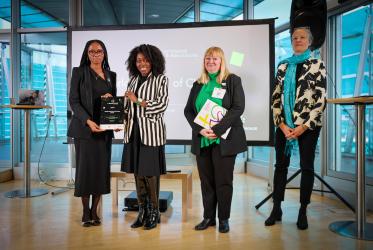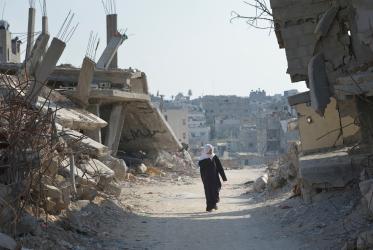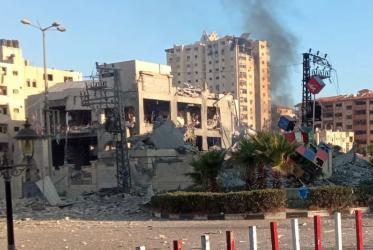Reflection during the morning prayer in the Ecumenical Centre, Geneva, 29 August 2016
by Marianne Ejdersten, director of communication for the WCC.
You never know what’s happening next in your life. You are of course able to make plans, all kind of plans, especially if you are a Swede, but the most unexpected could happen, to you and to me. I have learned that through my life. Everything could happen, and joy and sorrow walk hand in hand. If anyone should have told me for four years ago that I would be working for the WCC and be the director of communication, I would have responded: nice joke! Totally unexpected plan for me. It has never been top of my mind.
The worship committee asked me to give a reflection this morning as one way to share some insights from my first 18 months as director of communication. Altogether I have worked for around 20 years in an ecumenical environment, first in a local Lutheran congregation in Sweden for 12 years and then 12 years at the national level in the Church of Sweden in various positions, and now at the World Council of Churches. In these 20 years I have often reflected on the questions: how can one continue to work for peace and justice in a good spirit? How can one bring hope and serve those who count on us? I have learned that full engagement over a long period of time requires a fine balance between commitment and accompaniment. It needs a continuous alternation between hard work and time to reflect, listening and learning from one another. You need an open heart in the ecumenical environment. I try to summarize my experience in three words – peace, love and respect – three small words or 16 letters – but they are able to change the world! Sometimes, could words become the real barriers in the world?
These reflections on our day-to-day challenges reminded me of these words from Luke 14:11.
Those who exalt themselves will be humbled, but those who humble themselves will be exalted. Luke 14:11
Listening to those words from Luke, one starts to understand that justice, here, means inclusiveness, especially inclusiveness of those who are vulnerable and depending on the support of others.
However, my feeling is that Luke wants to challenge us. It seems that he calls our attention to a different life methodology. Let us read again his words.
“But when you are invited, take the lowest place, so that when your host comes, he will say to you, ‘Friend, move up to a better place.’ Then you will be honoured in the presence of all the other guests. 11 For all those who exalt themselves will be humbled, and those who humble themselves will be exalted.”
How does he want to reach that ambitious and hopeful goal of inclusive justice? What kind of life methodology does he want to apply? We find a surprising approach:
Then Jesus said to his host, “When you give a luncheon or dinner, do not invite your friends, your brothers or sisters, your relatives, or your rich neighbours; if you do, they may invite you back and so you will be repaid. 13 But when you give a banquet, invite the poor, the crippled, the lame, the blind, 14 and you will be blessed. Although they cannot repay you, you will be repaid at the resurrection of the righteous.”
There is a term popular today that I would like us, that term is "comfort zone." As I understand it, a person's comfort zone refers to those situations in which the person feels comfortable, safe, and free from threat or even challenge. The comfort zone is, for the person involved, a comfortable place.
It's natural to like one's comfort zone, but most of us would admit that we should not remain there. People do not become better or more mature or holier in their comfort zone. That just doesn't happen. The passage divides easily into two parts.
In the first part, Jesus cautions against sitting in the place of honour at a wedding banquet and advises taking the lowest place instead.
In the second part, he urges us to invite the crippled, lame, and blind when we give a luncheon or dinner, rather than friends, relatives, and rich people.
The only alternative is looking for the low seat and making room for the unseemly guest, moving to encounter unexpected challenges––this is what it means to follow Jesus. This is what it means to live the life of faith.
The ecumenical movement has been a space of learning for many. It is through participating in the daily reality and struggle for life that we have the possibility of understanding better what the Christian faith is. The divine message of the incarnation “Peace on earth!” can have many dimensions, but it is meaningless without a dimension of a just peace between human beings.
What does this mean for our pilgrimage of justice and peace? How can we develop an approach to advocacy that is effectively leading to justice and peace without engaging ourselves in power-politics? What does that mean when we try to influence the negotiations with governments? Is our methodology different from the lobby methods of others?
I have visited the Holy Land six times the last year. Probably 20 times the last 20 years. I came back from my latest visit last week. I just wonder; how could we bring just peace to the Holy Land? Is it possible? They are losing hope. You could really see and feel the hopelessness the last year. Even young people are losing their hope.
For decades the Holy Land, has been a land of war, oppression, injustice and death. All the world’s Christians trace their faith’s roots to the Holy Land: it is the spiritual homeland for all Christians in the world.
Therefore, Christians everywhere are called to prayer and action for healing in the Holy Land. They are called to act for justice and peace in the Holy Land. Peace with justice requires ending the long conflict, occupation, injustice and all acts of violence and terrorism and bringing back the land we call Holy to wholeness, peace, redemption and reconciliation for all of its inhabitants.
But how?
Look back on the last 10-15 years with ever-increasing settlements and a growing separation barrier. The deadlocked peace. I could both see and feel the hopelessness.
But there is hope – of course, we have to keep the hope – who else would do that?!
I met with the first Palestinian Latin Patriarch Michel Sabbah last week. He is 84 years old and living in the monastery with St Birgitta Sisters in Jerusalem. (Yes, the Swedish Saint Birgitta). He told me, “We have to try harder. We have to do the unexpected. We have to build bridges of love, respect and understanding. We have to get to know each other. Then we will get peace. We have to facilitate space for Israeli and Palestinian NGOs working for peace to meet and get to know each other. There are indeed growing separation barriers, but worst of all is the fear, fear among the Israeli people and the Palestinian people. They don’t trust anyone. If, the patriarch said, if we are able to bring trust and respect – then we have solved the whole Middle East crisis. The process of reconciliation must start now and continue over next generations. Then we will get world peace!
I asked the patriarch; what could we do as the WCC? He looked at me and smiled: You have already started 1948, you are listening to others, you are praying, you are visiting, you are sharing stories of hope – please, do the unexpected from your side. Don’t give up. Please, continue. Please, invite the unexpected to your table, build unexpected bridges. I asked His Beatitude; Who? That’s your job to find out, said the patriarch.
He said: A separation barrier is done by stones. Human beings are living stones. Focus on the living stones - beyond the barriers, beyond the fear, beyond the words.
My feeling is that we need to do more work to develop this spirituality of peace, love and respect in our way to work and live. In the small settings, in our daily life in the ecumenical centre, in our families and in the wider fellowship.
We need to avoid resigning ourselves to doing our ecumenical business as usual without feeling the urgency to be the light of hope. We need this spirituality for justice and peace. May God guide and bless us in our search for the right way forward to build unexpected bridges!
As closing words I’ll use the prayer by the peacemaker and former Swedish archbishop Nathan Söderblom:
"Lord, be before us to guide us, be behind us to push us, be beneath us to carry us, be above us to bless us, be around us to protect us, be in us so that in body and soul we serve you for the glory of your Name."





